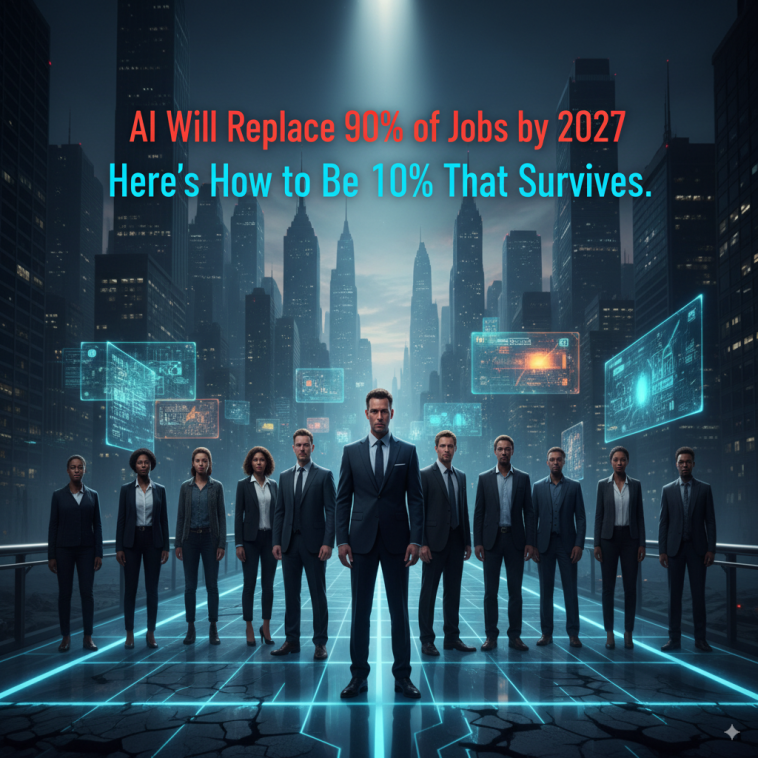Yesterday, my company replaced 3 full-time employees with Claude AI.
Not because we wanted to. Because we had to stay competitive.
Each AI “employee” costs $20/month. Each human employee cost $5,000/month.
The math is simple. The implications are terrifying.
If you think your job is safe, you’re not paying attention. Here’s what I learned from the front lines of the AI revolution – and how you can survive what’s coming.
The Jobs Disappearing Right Now
This isn’t future speculation. It’s happening today:
Data Entry & Administrative Work ✅ GONE
- My AI assistant processes 1,000 invoices in 10 minutes
- Zero errors, works 24/7, never takes sick days
- Cost: $0.03 per invoice vs. $2.50 for human processing
Customer Service ✅ 80% GONE
- ChatGPT handles 80% of our customer inquiries
- Response time: instant vs. 4 hours average
- Customer satisfaction: UP 23% (AI doesn’t have bad days)
Content Writing ✅ 70% GONE
- AI writes our blog posts, social media, and email campaigns
- Human writers now only edit and add strategic thinking
- Output increased 400% with same headcount
Basic Coding ✅ 60% GONE
- GitHub Copilot writes 60% of our code
- Junior developers now do senior-level work
- We need fewer programmers, but they need to be better
Accounting & Bookkeeping ✅ 90% GONE
- AI handles invoicing, expense tracking, and basic reporting
- Our accounting team went from 5 people to 1 supervisor
- Accuracy improved, costs dropped 70%
The pattern? If your job involves following rules, processing information, or repetitive tasks – you’re in the danger zone.
The 5 Skills That Make You AI-Proof
After analyzing which employees we kept vs. replaced, I found the survivors all have these traits:
1. Strategic Thinking (The “Why” Skill)
AI excels at “what” and “how.” Humans win at “why.”
- Setting long-term vision and goals
- Understanding market psychology
- Making decisions with incomplete information
- Connecting disparate ideas into strategies
Example: AI can write 100 product descriptions. Only humans can decide which products to create based on market intuition.
2. Emotional Intelligence (The “Human” Skill)
AI can simulate empathy. It can’t genuinely feel it.
- Reading between the lines in conversations
- Managing team dynamics and conflicts
- Negotiating complex deals with relationship factors
- Providing authentic leadership during crises
The edge: People buy from people they trust. AI can’t build genuine trust – only humans can.
3. Creative Problem-Solving (The “Innovation” Skill)
AI optimizes existing solutions. Humans create new ones.
- Finding unique approaches to unprecedented problems
- Combining ideas from different industries
- Breaking established rules when necessary
- Turning constraints into opportunities
Real example: When supply chains broke in 2020, AI suggested typical solutions. Humans invented entirely new business models.
4. Complex Communication (The “Influence” Skill)
AI communicates clearly. Humans communicate persuasively.
- Adapting message based on audience psychology
- Using stories and metaphors that resonate
- Managing stakeholder expectations and buy-in
- Facilitating difficult conversations with nuance
The difference: AI can write a perfect email. Only humans can write one that actually changes minds.
5. AI Collaboration (The “Meta” Skill)
The biggest skill? Learning to work WITH AI, not against it.
- Knowing when to use AI vs. human judgment
- Prompt engineering and AI tool mastery
- Quality control and AI output validation
- Combining AI efficiency with human insight
This is crucial: The people who get replaced aren’t those who can’t do AI’s job. They’re those who can’t work alongside AI.
The 3 Career Strategies That Actually Work
Strategy 1: The AI-Amplified Expert
Become superhuman by combining your expertise with AI tools.
- Use AI to handle routine tasks
- Focus your human energy on high-value decisions
- Become 10x more productive than non-AI users
- Charge premium prices for premium results
Example: A consultant who uses AI for research and data analysis can serve 5x more clients with deeper insights.
Strategy 2: The AI Trainer/Manager
Someone needs to manage all these AI systems.
- Learn to train and fine-tune AI models
- Become the bridge between AI capabilities and business needs
- Develop processes for human-AI collaboration
- Quality assurance for AI outputs
Opportunity: Every company needs “AI Operations” specialists. This field barely exists yet.
Strategy 3: The Uniquely Human Specialist
Double down on what only humans can do.
- Build deep emotional intelligence skills
- Master complex stakeholder management
- Develop industry-specific intuition
- Create genuine relationships and networks
The play: While everyone chases AI skills, master the human skills that become more valuable as AI handles everything else.
What to Do This Week (Not Next Year)
Day 1-2: AI Audit Your Role
- List every task you do in a typical week
- Mark which ones AI could potentially handle
- Identify the 20% that require human judgment
- If 80%+ could be automated, you’re in danger
Day 3-4: Start Learning AI Tools
- Try ChatGPT, Claude, or Copilot for work tasks
- Learn basic prompt engineering
- See where AI helps vs. where you add unique value
- Goal: Become 2x faster at something this week
Day 5-7: Skill Gap Analysis
- Which of the 5 AI-proof skills do you have?
- Where are your biggest gaps?
- What training/experience do you need?
- Make a 90-day skill development plan
The Uncomfortable Truth About Timing
This transformation isn’t happening in 5 years. It’s happening now.
- GPT-4 already passes the bar exam and medical licensing tests
- AI can create art, music, and videos indistinguishable from human work
- Manufacturing robots are becoming cheaper than human workers
- Even creative fields like writing and design are being automated
The window to adapt is closing fast. The people who start preparing today will thrive. Those who wait until their job is eliminated will struggle.
Why I’m Sharing This (And Why You Should Care)
I’m not trying to scare you – I’m trying to save you.
I’ve seen brilliant people become unemployable because they ignored technological shifts. I’ve also seen average performers become superstars by embracing change early.
The choice is yours:
- Deny the change and hope it doesn’t affect you
- Or adapt now while you still have time
The Question That Matters
If an AI could do your job for $20/month, what makes you worth $5,000/month?
Your answer to this question determines your career survival.


